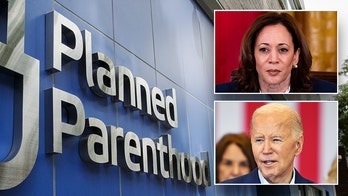DETROIT – Mitt Romney is turning his campaign message back to the economy as he tries to fend off Republican presidential rival Rick Santorum in crucial Michigan and Arizona primaries next week.
The former Massachusetts governor courted conservative tea party voters in Michigan -- where he was born and saw his father become governor -- Thursday night with an indictment of President Obama, calling him "comfortable living with trillion-dollar deficits." A day earlier in Arizona, Romney called for a 20 percent cut in personal income tax rates, saying it would help the economy grow and create jobs.
Next up is a speech before the Detroit Economic Club, in an automotive city that is struggling and a state where unemployment stood at 9.3 percent in December.
Obama has been most vulnerable on the economy as the general election approaches in November, but signs are growing that the recovery from the Great Recession is picking up speed.
The ultraconservative Santorum has switched the campaign narrative recently to focus on social issues, and he risen in the polls to a near tie for the Republican lead.
But Romney's campaign rests on a foundation of economic know-how, and the multimillionaire former venture capitalist continues to present himself as a lifelong businessman with the skills to end to the worst recession in decades.
Economy is a safer issue for Romney, as he still faces skepticism from more conservative Republicans over his past, more moderate positions on sensitive social issues such as abortion.
He was pulled into a discussion of social issues earlier in the week in Michigan, and again at a debate in Arizona on Tuesday with former Pennsylvania senator Santorum, former House of Representative speaker Newt Gingrich and Texas Rep. Ron Paul.
But Romney's remarks to the tea party audience Thursday were devoted to the economy.
"The highest priority is making sure we get on a track to a balanced budget," he said, adding that he would make sure his proposed across-the-board tax cut didn't interfere with plans to eliminate red ink.
Opinion polls show voters aligned with the tea party are more likely to support Santorum than Romney, and Romney went out of his way to praise them as part of his courtship.
"I appreciate the work you're doing. I appreciate your willingness to get out of your homes," he said.
While he drew applause, it wasn't clear how much support he picked up.
"I am an undecided voter," said Mary Ann Cherasaro, a tea party member. She said she wasn't ready to choose between Romney and Santorum.
"He knows what has to get done. He knows how to do it. The thing we've got to do is get rid of Obama," said her husband, Nick Cherasaro.
Romney and the Republican establishment that largely supports him are counting on that sentiment -- that Romney is more electable -- to get him the nomination at the party's convention in August.
He remains the front-runner in terms of delegates to the convention and in campaign fundraising, though finance reports released this week show the momentum from Romney donors slowed in January.
Backed by ads attacking Santorum from his own campaign and from Restore Our Future, an outside group that supports him, Romney has made gains in the past week in Michigan. But numerous polls show that Republicans who say they support one of the candidates could change their mind.
Tuesday's vote could end in a kind of split decision in which Romney wins the popular vote but Santorum emerges with more delegates. Most of them are awarded, two at a time, to the winner of each of the state's 14 congressional districts.
In all there are 30 delegates at stake in Michigan next week, and 29 in winner-take-all Arizona.
On the horizon is Super Tuesday, when 10 states vote March 6.




